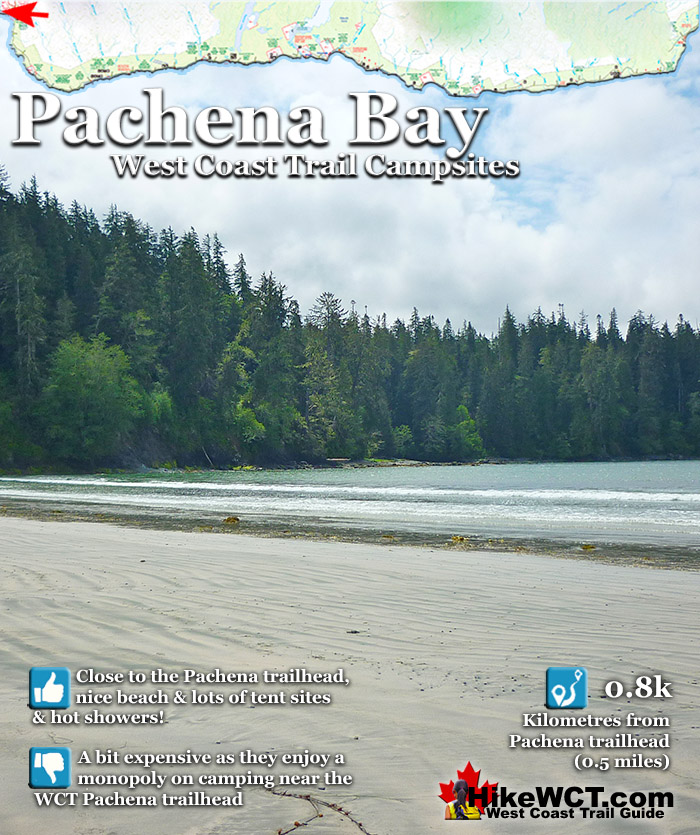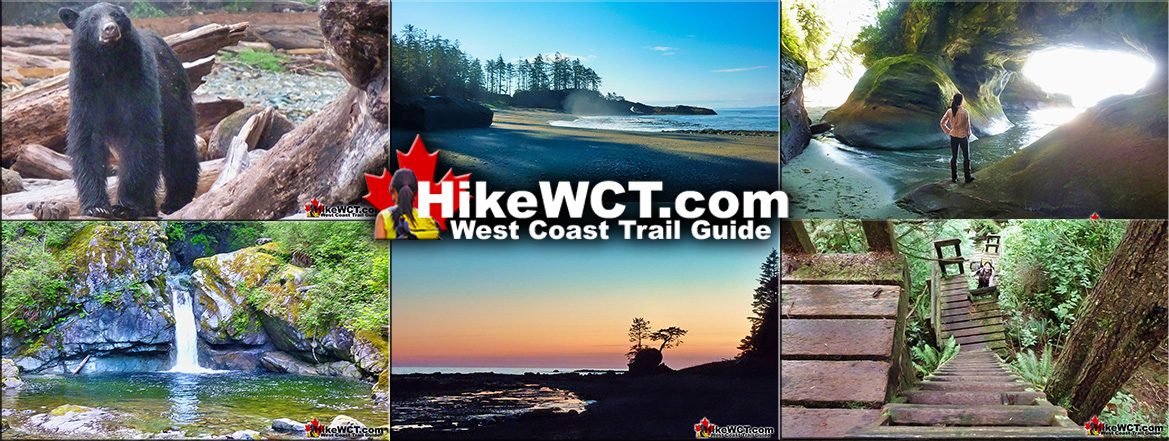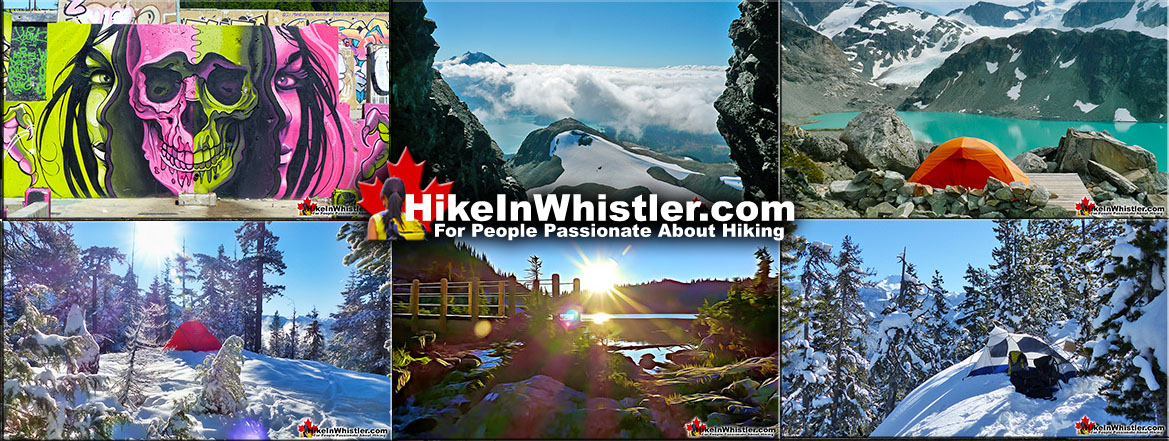![]() The Pachena Bay Campground is the closest campsite to the Pachena trailhead, not on the West Coast Trail, but near the trailhead.. Located on the far end of Pachena Beach, and about a 10 minute walk from the trailhead and the West Coast Trail registration building. Keep in mind that this is not on the West Coast Trail or affiliated with the WCT. Pachena Bay Campground is run by the Huu-ay-aht First Nations which resides nearby in the community of Anacla.
The Pachena Bay Campground is the closest campsite to the Pachena trailhead, not on the West Coast Trail, but near the trailhead.. Located on the far end of Pachena Beach, and about a 10 minute walk from the trailhead and the West Coast Trail registration building. Keep in mind that this is not on the West Coast Trail or affiliated with the WCT. Pachena Bay Campground is run by the Huu-ay-aht First Nations which resides nearby in the community of Anacla.
 Beautiful, huge beach and great ocean views
Beautiful, huge beach and great ocean views Pacheena River is unexpectedly beautiful
Pacheena River is unexpectedly beautiful Good amenities for sports
Good amenities for sports Hot showers and fresh water
Hot showers and fresh water Good dayhikes just steps away
Good dayhikes just steps away Very close to the WCT trailhead!
Very close to the WCT trailhead! Large beach rarely feels busy
Large beach rarely feels busy Awful & long, potholed logging road to get there
Awful & long, potholed logging road to get there Better to bus there & park at the other end of the WCT
Better to bus there & park at the other end of the WCT A bit pricey & $10 extra for another tent
A bit pricey & $10 extra for another tent
West Coast Trail Campsites
![]() Michigan Creek at 12km
Michigan Creek at 12km ![]() Darling River at 14km
Darling River at 14km ![]() Orange Juice Creek at 15km
Orange Juice Creek at 15km ![]() Tsocowis Creek at 16.5km
Tsocowis Creek at 16.5km ![]() Klanawa River at 23km
Klanawa River at 23km ![]() Tsusiat Falls at 25km
Tsusiat Falls at 25km ![]() Cribs Creek at 42km
Cribs Creek at 42km ![]() Carmanah Creek at 46km
Carmanah Creek at 46km ![]() Bonilla Creek at 48km
Bonilla Creek at 48km ![]() Walbran Creek at 53km
Walbran Creek at 53km ![]() Cullite Cove at 58km
Cullite Cove at 58km ![]() Camper Bay at 62km
Camper Bay at 62km ![]() Thrasher Cove at 70km
Thrasher Cove at 70km
The campsite is pretty good, but like most privately run, near-trailhead campsites, it is a bit crowded and very well used. It is also a bit expensive at $34 for a tent site, but you are getting a great location. Along with the location, the beach itself is terrific. Huge, sandy beach with a sweeping ocean view as well as the occasional bear visitor in the distance. Pachena Bay stretches for 3 kilometres of beautiful, fine, beige sand. The beach is about 200 metres wide and somewhat similar to Long Beach in Pacific Rim National Park just a few kilometres north. Bamfield is just 3 kilometres down a gravel road and is a wonderful old fishing community that takes you back a few decades(in a good way). It is lovely, wild and very remote feeling. Many visitors to Pachena Bay are setting off on the West Coast Trail, however you will find some very nice, short, and free hiking trails nearby. These hikes are varied and each wonderful in their own right. Cape Beale Headlands, Keeha Beach, Kicha Lake and the trail to Bamfield all run through the centuries old rainforest in an unexpectedly wild and pristine setting. For big crashing waves and sweeping views of the Pacific, Cape Beale and Keeha Beach are impressive. Sportsfishing in the area around the campground is famous throughout the world. Anglers fishing Barkley Sound and offshore areas catch halibut, sockeye, chinook, chum and pink salmon. The prime fishing season is May to September. Charter packages can include boat, guide, gear, tackle and weather gear. There is a boat ramp and moorage available in Bamfield. Enjoy a day cruise along the scenic Alberni Canal and into magnificent Barkley Sound aboard an historic and picturesque coastal steamer. The M.V. Frances Barkley runs year-round between Port Alberni and Bamfield.
En route, be prepared for a spectacular show of west coast wildlife: bald eagles, black bears, sea lions, otters, grey whales, and orcas (killer whales). The marine ecology in the ocean waters around the Pachena Bay Campground offers some of the best diving in the world. A group of Canadian universities operates a research facility at the Bamfield Marine Sciences Centre, and a group of American universities operates the School for Field Studies, also located in Bamfield, near the campground. Divers to the region can explore a wonderful underwater world, or examine sunken wrecks in the “Graveyard of the Pacific.” Scuba air is available nearby in Bamfield.
Beautiful Pachena Bay at the Trailhead
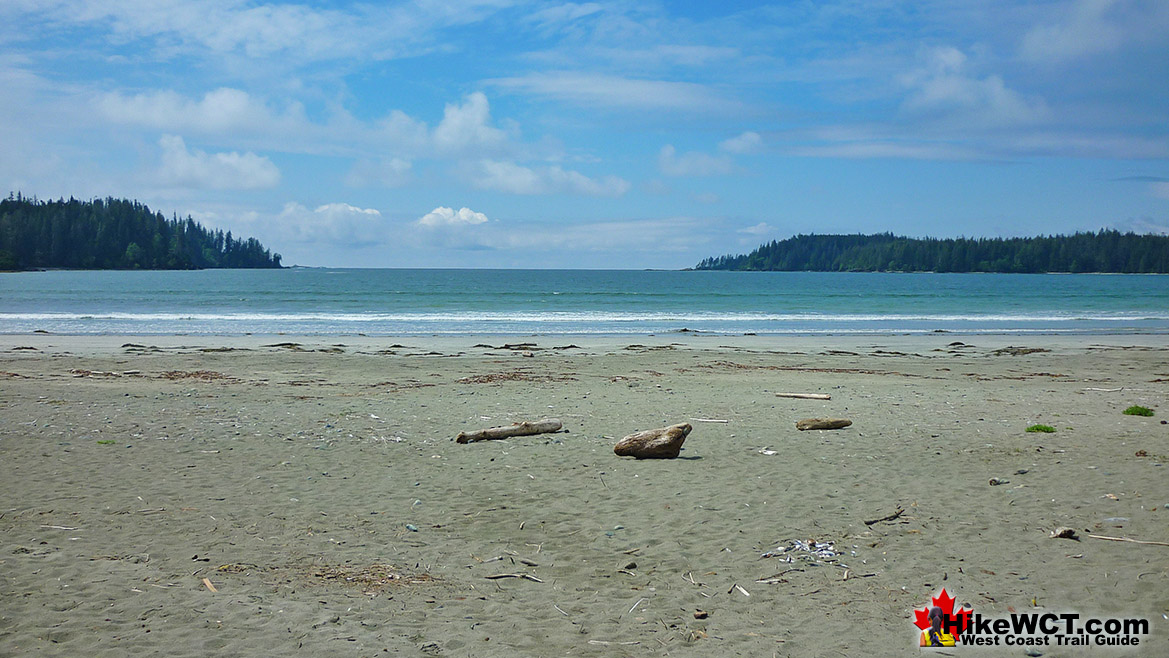
Pachena Bay Campground West Coast Trail
![]() From the Pachena Bay Campground kayakers can explore the Pachena River, Pachena Bay, Seabird Islands, Clutus Point, Keeha Bay, Pachena Point and Cape Beale. You may witness soaring eagles, frolicking sea lions, majestic whales, prowling orcas (killer whales), or black bears foraging along the shore. Kayaks can be rented in Bamfield. Some of the best opportunities for eco-tours are available around Pachena Bay. Whale-watching is popular, as whales migrate past Pachena Bay and Barkley Sound; some even enter inshore waters. Occasionally, whales can be seen from the campground, feeding along the shore near Clutus Point. There are eco-tour, sightseeing, whale watching, and day-sailing operators in Bamfield.
From the Pachena Bay Campground kayakers can explore the Pachena River, Pachena Bay, Seabird Islands, Clutus Point, Keeha Bay, Pachena Point and Cape Beale. You may witness soaring eagles, frolicking sea lions, majestic whales, prowling orcas (killer whales), or black bears foraging along the shore. Kayaks can be rented in Bamfield. Some of the best opportunities for eco-tours are available around Pachena Bay. Whale-watching is popular, as whales migrate past Pachena Bay and Barkley Sound; some even enter inshore waters. Occasionally, whales can be seen from the campground, feeding along the shore near Clutus Point. There are eco-tour, sightseeing, whale watching, and day-sailing operators in Bamfield.
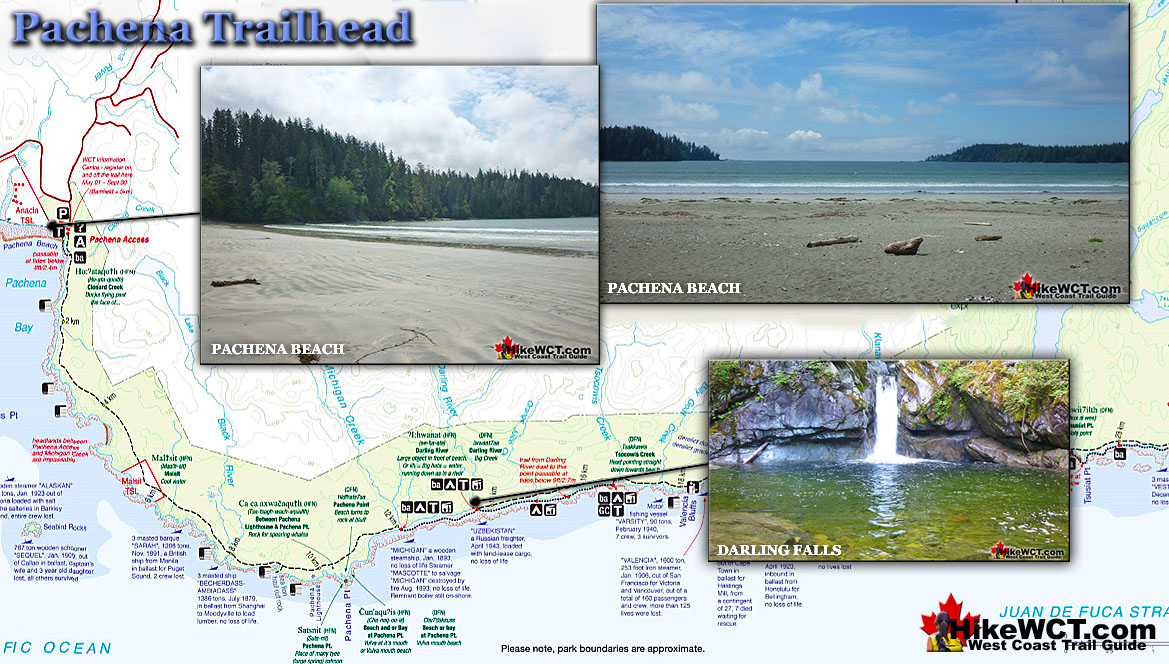
Driving to Pachena Bay
![]()
![]() It is quite a drive to get to Pachena Bay no matter which direction you come from. From Victoria it is a whopping 5-6 hours. Much of that is on a brutally bad logging road that is frequented by gigantic logging trucks barrelling past. If you are coming from Port Alberni, the driving time is 2 hours and from Duncan, 3 hours. If you are coming from the mainland via Nanaimo, the drive(from Nanaimo) is 3.5 hours). There is an excellent bus service that runs to and from both West Coast Trail trailheads. Owing to the fact that the West Coast Trail is a linear hiking trail, most park at one end and bus to the other. If you park at the Port Renfrew(Gordan River) trailhead you will save your car from the harsh logging road as the road to Port Renfew is lovely and paved. Another consideration is the Bamfield and Pachena West Coast Trail parking areas don't have the best reputation for security. In fact, so many cars in the past have been looted that secure parking lots have sprung up. There are a couple of nice ones in Port Renfew that cost about $10/day. Which sounds like a lot, but peace of mind is worth it. And they have convenient showers just steps from your car and they happily drive you to and from the West Coast Trail registration building near the the trailhead.
It is quite a drive to get to Pachena Bay no matter which direction you come from. From Victoria it is a whopping 5-6 hours. Much of that is on a brutally bad logging road that is frequented by gigantic logging trucks barrelling past. If you are coming from Port Alberni, the driving time is 2 hours and from Duncan, 3 hours. If you are coming from the mainland via Nanaimo, the drive(from Nanaimo) is 3.5 hours). There is an excellent bus service that runs to and from both West Coast Trail trailheads. Owing to the fact that the West Coast Trail is a linear hiking trail, most park at one end and bus to the other. If you park at the Port Renfrew(Gordan River) trailhead you will save your car from the harsh logging road as the road to Port Renfew is lovely and paved. Another consideration is the Bamfield and Pachena West Coast Trail parking areas don't have the best reputation for security. In fact, so many cars in the past have been looted that secure parking lots have sprung up. There are a couple of nice ones in Port Renfew that cost about $10/day. Which sounds like a lot, but peace of mind is worth it. And they have convenient showers just steps from your car and they happily drive you to and from the West Coast Trail registration building near the the trailhead.
Getting to the West Coast Trail trailheads continued here...
Campsites Near Pachena Bay
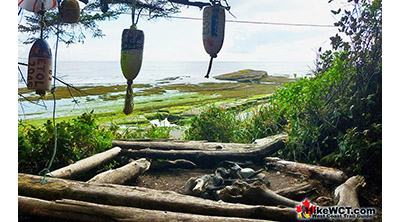 KM12: Michigan Creek Campsite
KM12: Michigan Creek Campsite
The Pachena Bay Campground is not on the West Coast Trail, but close to the trailhead. The first campsite you will encounter on the West Coast Trail is the Michigan Creek campsite at 12 kilometres. This is a fairly mediocre campsite as it has a bit of an ugly beach and is always quite crowded. On the plus side, the shipwreck of the Michigan can be seen(and touched), as the big, rusting boiler from the ship that met its end on this shore over a century ago. A couple kilometres past Michigan Creek is the much nicer, Darling River campsite. Darling is often far less busy. And you have quick access to Darling Falls, not mentioned on West Coast Trail guidebooks. Michigan Creek campsite continued here...
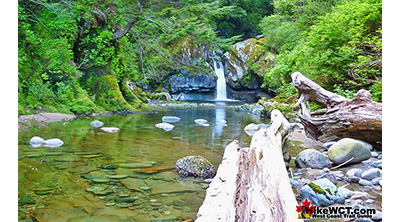 KM14: Darling River Campsite
KM14: Darling River Campsite
The second, or second to last campsite on the West Coast Trail is at Darling River. Located just 1.6 kilometres(1 mile) from Michigan Creek, the Darling River campsite has an alright, sandy beach and a truly wonderful waterfall. Darling Falls pour into a stunning, emerald coloured pool nestled against a short cliff. The falls only drop about three or four metres as they fill the pool at the base and flowing down to the ocean in an ever-narrowing torrent of water. The campsite at Darling River is the best along this stretch of the West Coast Trail because of the beautiful falls and river, as well as being far less busy than the Michigan Creek campsite. Darling River campsite continued here...
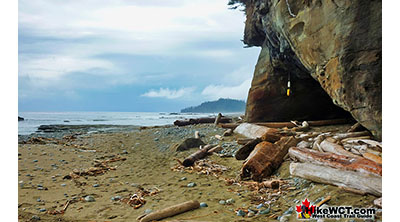 KM15: Orange Juice Creek Campsite
KM15: Orange Juice Creek Campsite
Just a kilometre past the Darling River campsite you will come to another beach campsite at Orange Juice Creek. Orange Juice Creek is not terribly pretty and gets its name from the intensely, orange juice coloured water that crashes through a tangled morass of driftwood logs. If you aren't keen on swimming and/or washing at Darling Falls, Orange Juice Creek is a good alternative. Orange Juice Creek is the third(or third to last) campsite on the West Coast Trail. Michigan Creek, Darling River, Orange Juice Creek and Tsocowis Creek are all along a fairly continuous beach that stretches for 5 kilometres. All are easily within a days hike from or to the Pachena trailhead. Orange Juice Creek campsite continued here...
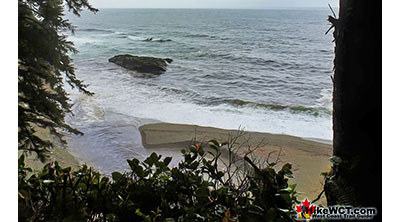 KM16: Tsocowis Creek Campsite
KM16: Tsocowis Creek Campsite
The Tsocowis Creek campsite at 16.5km has a decent beach with an excellent water source. Most hikers pass through the beach here on their way to Michigan if heading north or Tsusiat Falls if hiking south. The beach at Tsocowis is fairly decent and there is plenty of room for tents along the beach amongst the driftwood logs. Tsocowis Beach has a lot of interesting features to explore. Shipwreck debris, stunning sandstone cliffs with a wonderful sea cave. Tsocowis Falls brings excellent, fresh water just steps from your tent. Ladders near the campsite take you up above and over Tsocowis Falls. The view from the top of the ladders and on the bridge are fantastic. Tsocowis Creek campsite continued here...
Best West Coast Trail Sights & Highlights
West Coast Trail Campsites
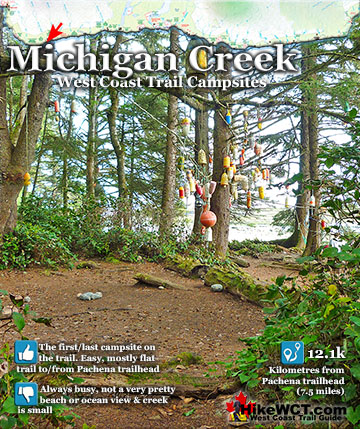
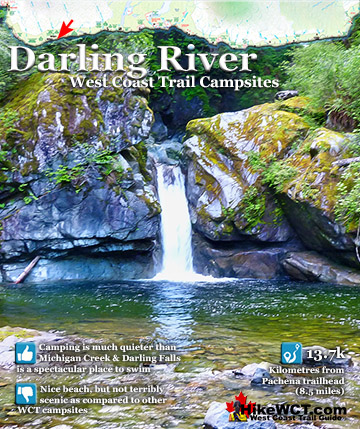
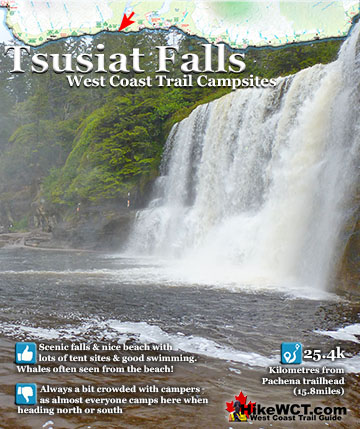
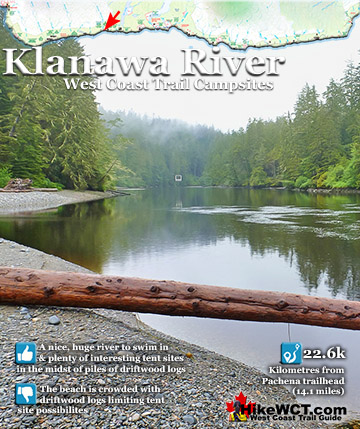
West Coast Trail A to Z
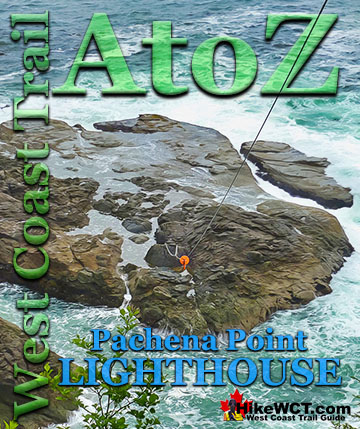
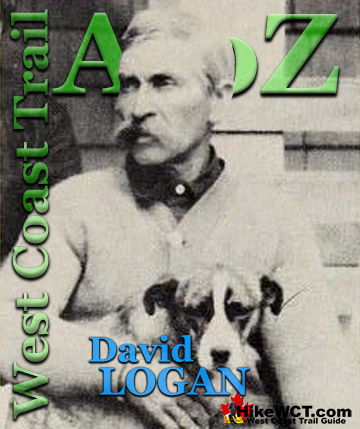
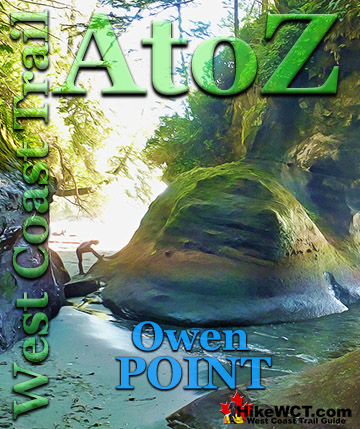
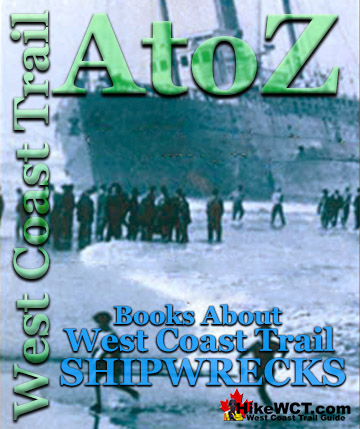
The West Coast Trail by Day
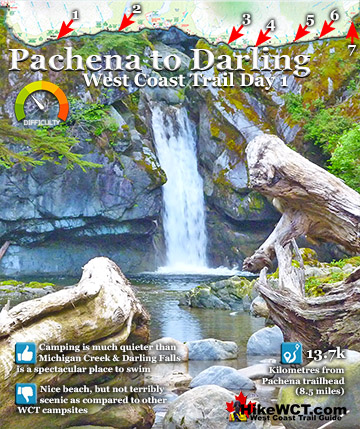
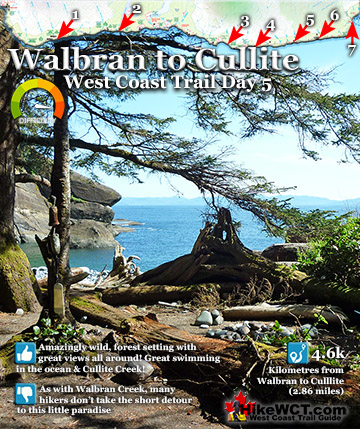
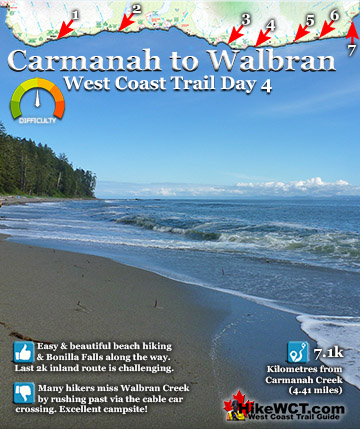
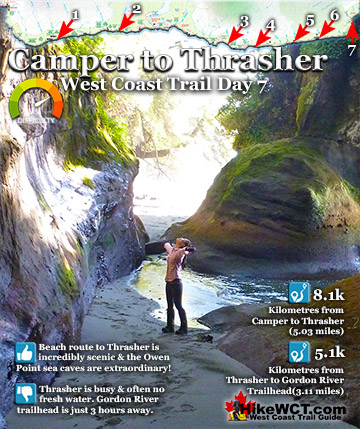
Explore BC Hiking Destinations!
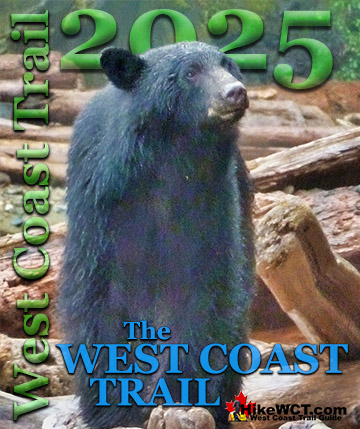
The West Coast Trail

Victoria Hiking Trails
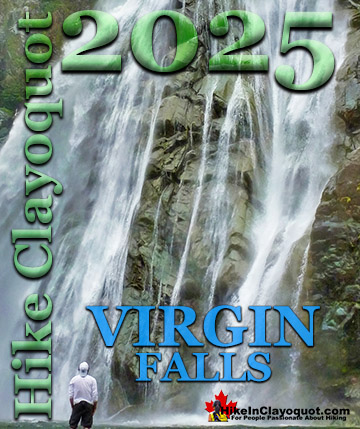
Clayoquot Hiking Trails

Whistler Hiking Trails
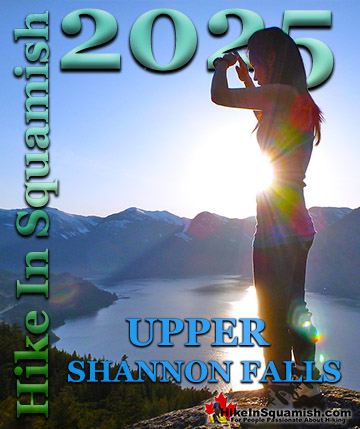
Squamish Hiking Trails

Vancouver Hiking Trails

